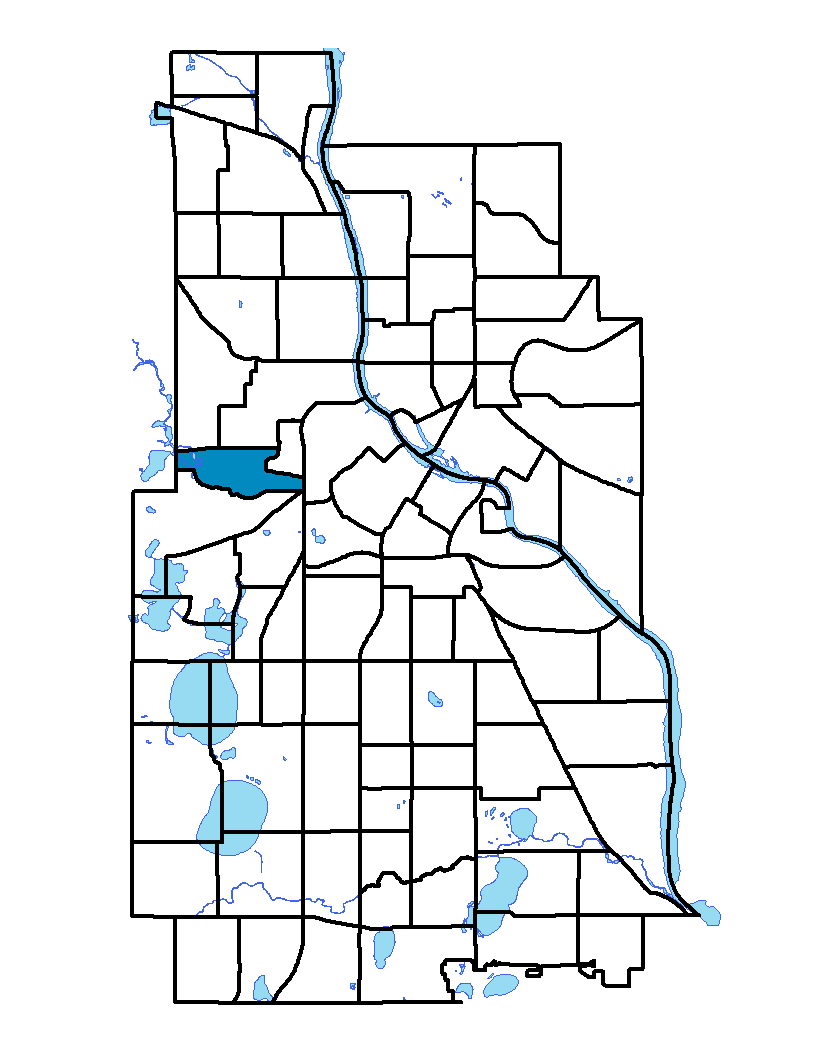Harrison neighborhood is on the western side of Minneapolis. The neighborhood is bound on the north by Highway 55 (Olson Memorial Highway), on the east by Interstate 94 and Lyndale Avenue North, on the south by Bassett's Creek and on the west by Theodore Wirth Park. It is named for Harrison Elementary School, which was named after William Henry Harrison – the ninth president of the United States, born in 1773. Parcels of industrial land occupy the neighborhood east of Cedar Lake Road, while the western part is mainly residential. Bassett's Creek Park is on the banks of Bassett's Creek in the southwest and continues to the northwest as Theodore Wirth Park.
To learn more about the neighborhood association visit: www.hnampls.org
Indicator Details
| Indicators | Primary Domain | Indicator Value |
Rank |
Tier |
|---|---|---|---|---|
| Excessive Housing Cost Burden | Housing | 50.5% | 83 | Bottom |
| Travel Time to Work | Employment Opportunities | 25.5 minutes | 83 | Bottom |
| Public Assisted Households | Employment Opportunities | 74.1% | 80 | Bottom |
| Employment Rate | Employment Opportunities | 47.9% | 79 | Bottom |
| Access to Mainstream Financial Services | Economic Health | 45.4% | 77 | Bottom |
| Voter Participation | Social Cohesion | 14.9% | 76 | Bottom |
| Proximity to Superfund Sites | Environmental Hazards | 78.7% | 74 | Bottom |
| Adult Educational Attainment | Educational Opportunities | 77.0% | 72 | Bottom |
| Business Retention | Economic Health | -1.5% | 69 | Bottom |
| Transit Accessibility | Transportation | 204.7 | 68 | Bottom |
| Violent Crime | Health Systems and Public Safety | 74.7 | 68 | Bottom |
| Pedestrian Connectivity | Transportation | 109.1 | 61 | Bottom |
| Preschool Enrollment | Educational Opportunities | 40.6% | 55 | Middle |
| Vacancy Rates | Housing | 8.6% | 53 | Middle |
| Proximity to Brownfield Sites | Environmental Hazards | 9.3% | 53 | Middle |
| Walkability | Neighborhood Characteristics | 60 | 50 | Middle |
| Low Birth Weight | Health Systems and Public Safety | 8.0% | 50 | Middle |
| Toxic Releases from Facilities | Environmental Hazards | 1.3% | 46 | Middle |
| Preventable Hospitalizations | Health Systems and Public Safety | 2.9 | 46 | Middle |
| Chronic School Absence | Health Systems and Public Safety | 88.4% | 45 | Middle |
| Residential Mobility | Social Cohesion | 79.1% | 43 | Middle |
| Residential Proximity to Traffic | Environmental Hazards | 2.7% | 42 | Middle |
| Local Business Vitality | Economic Health | 55.8% | 37 | Middle |
| Motor Vehicle Collisions | Health Systems and Public Safety | 4.6 | 37 | Middle |
| Blood Lead Levels in Children | Housing | 3.4% | 33 | Middle |
| Long-Term Unemployment | Employment Opportunities | 4.7% | 32 | Middle |
| Household Transportation Costs | Transportation | 16.0% | 30 | Middle |
| Commute Mode Share | Transportation | 35.2% | 27 | Top |
| Food Desert | Neighborhood Characteristics | 66.7% | 27 | Top |
| Access to Parks and Open Space | Natural Areas | 14.0% | 19 | Top |
| Age of Housing | Housing | 71.2% | 17 | Top |
| Offsite Alcohol Outlets | Neighborhood Characteristics | 1 | 6 | Top |
| Tree Cover | Natural Areas | 37.1% | 6 | Top |
| School Proximity to Traffic | Environmental Hazards | 0.0% | 1 | Top |
| Reading Proficiency | Educational Opportunities | -% | - | Data N/A |
| High School Graduation Rate | Educational Opportunities | -% | - | Data N/A |
| School Readiness Scores | Educational Opportunities | -% | - | Data N/A |

